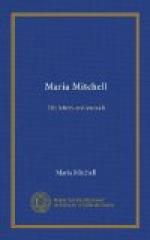“The physical and the spiritual seem to be, at present, separated by an impassable gulf; but at any moment that gulf may be overleaped—possibly a new revelation may come....
“April, 1878. I called on Professor Henry at the Smithsonian Institute. He must be in his eightieth year; he has been ill and seems feeble, but he is still the majestic old man, unbent in figure and undimmed in eye.
“I always remember, when I see him, the remark of Dorothy Dix, ’He is the truest man that ever lived.’
“We were left alone for a little while, and he introduced the subject of his nearness to death. He said, ’The National Academy has raised $40,000, the interest of which is for myself and family as long as any of us live [he has daughters only], and in view of my death it is a great comfort to me.’ I ventured to ask him if he feared death at all. He said, ’Not in the least; I have thought of it a great deal, and have come to feel it a friend. I cherish the belief in immortality; I have suffered much, at times, in regard to that matter.’ Scientifically considered, only, he thought the probability was on the side of continued existence, as we must believe that spirit existed independent of matter.
“He went to a desk and pulled out from a drawer an old copy of ‘Gregory’s Astronomy,’ and said, ’That book changed my whole life—I read it when I was sixteen years old; I had read, previously, works of the imagination only, and at sixteen, being ill in bed, that book was near me; I read it, and determined to study science.’ I asked him if a life of science was a good life, and he said that he felt that it was so.
“... When I was travelling with Miss S., who was near-sighted and kept her eyes constantly half-shut, it seemed to me that every other young lady I met had wide, staring eyes. Now, after two years sitting by a person who never reasons, it strikes me that every other person whom I meet has been thinking hard, and his logic stands out a prominent characteristic.
“Aug. 27, 1879. Scientific Association met at Saratoga. ... Professor Peirce, now over seventy years old, was much the same as ever. He went on in the cars with us, and was reading Mallock’s ’Is Life Worth Living?’ and I asked, ‘Is it?’ to which Professor Peirce replied, ’Yes, I think it is.’ Then I asked, ’If there is no future state, is life worth living?’ He replied, ’Indeed it is not; life is a cruel tragedy if there is no immortality.’ I asked him if he conceived of the future life as one of embodiment, and he said ’Yes; I believe with St Paul that there is a spiritual body....’
“Professor Peirce’s paper was on the ‘Heat of the Sun;’ he considers the sun fed not by impact of meteors, but by the compression of meteors. I did not think it very sound. He said some good things: ’Where the truth demands, accept; what the truth denies, reject.’




